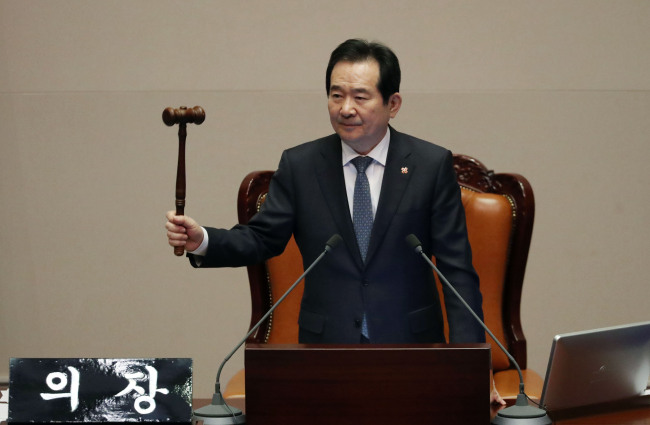The National Assembly on Thursday failed to pass a revision bill to extend the period of the special investigation into the President Park Geun-hye corruption scandal, as the legislation chief refused to use his authority to directly bring the revision bill to the floor.
Earlier in the day, four opposition parties requested National Assembly Speaker Rep. Chung Sye-kyun to put the revision bill directly to a vote -- without the approval of the parliamentary legislation and judiciary committee.
But Rep. Chung reiterated his refusal a day earlier, saying the current situation could not be seen as a “national emergency” and therefore lacks justification to bypass the parliamentary procedure.
 |
Assembly Speaker Chung Sye-kyun announces the opening of the plenary session Thursday. (Yonhap) |
With the judiciary committee’s conservative lawmakers from the ruling Liberty Korea Party opposing their counterparts’ proposal, the motion failed to reach the floor.
“We express apology to the citizens who longed for the extension of the investigation,” Rep. Woo Sang-ho, the floor leader of the main opposition Democratic Party of Korea, said Thursday.
The Liberty Korea Party criticized the opposition parties for “instigating the public and being irresponsible.”
“The opposition parties are seeking to rush through bills. They only care about securing voters for the upcoming presidential election,” Rep. Chung Woo-taik, the party’s floor leader said.
The special investigation team led by independent counsel Park Young-soo expired Tuesday, ending its 90 days of investigation into allegations that President Park allowed her confidante Choi Soon-sil to meddle in state affairs and colluded with her in extorting funds from conglomerates in exchange for business favors.
The opposition parties -- the Democratic Party, People’s Party, Justice Party and conservative Bareun Party -- which are seeking the ouster of Park from the presidential office, expressed regret over Chung’s decision Thusrday. The three liberal parties also vowed to motion for the impeachment of acting President and Prime Minister Hwang Kyo-ahn, who had the sole power to extend the probe.
Pending bills have once again been pushed to the next one-month extraordinary session that is to open from Friday to April 1, while several disputed laws were not even raised by committees to the floor, as the liberal and conservative blocs failed to reach consensus.
The left-wing parties sought to lower the voting age by a year to 18 years old, which would increase the number of eligible voters by some 600,000, but the ruling conservative Liberty Korea Party opposed the move.
Meanwhile, the parliament passed a long pending bill to allow Korean nationals living overseas to vote in early presidential elections, which occur when the presidential office is left vacant.
The revised election law will be applied from this year, meaning some 2 million citizens residing in foreign countries can also vote in this year’s earlier-than-expected presidential election.
By Jo He-rim (
herim@heraldcorp.com)







![[Today’s K-pop] Blackpink’s Jennie, Lisa invited to Coachella as solo acts](http://res.heraldm.com/phpwas/restmb_idxmake.php?idx=644&simg=/content/image/2024/11/21/20241121050099_0.jpg)
